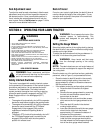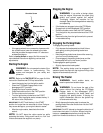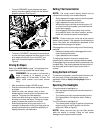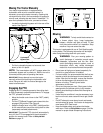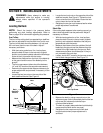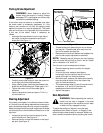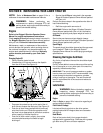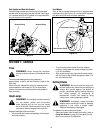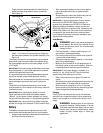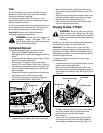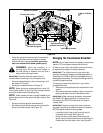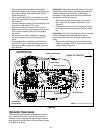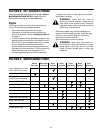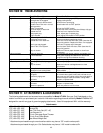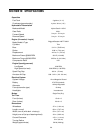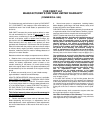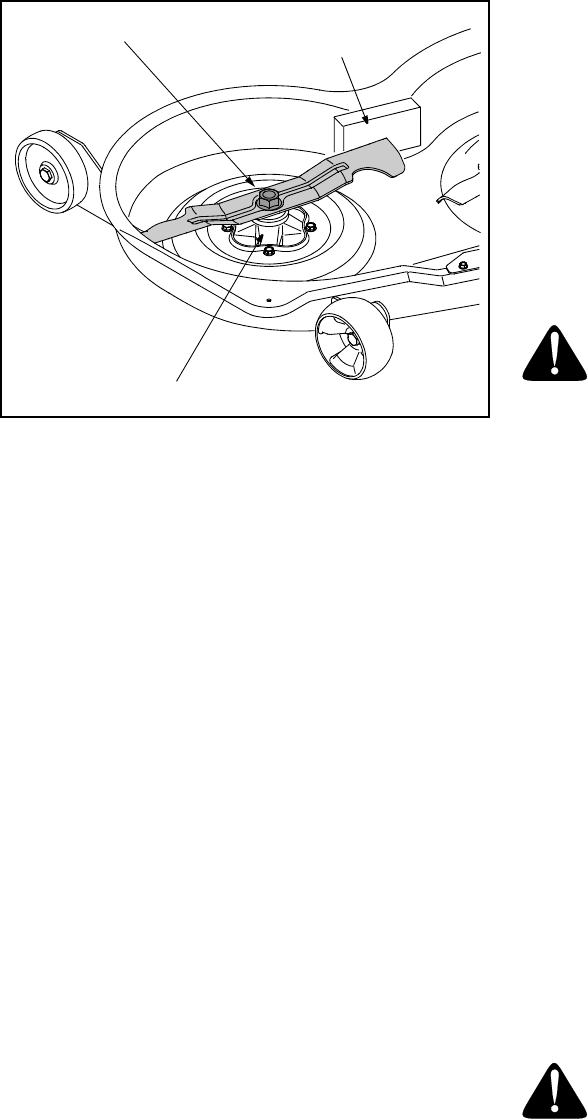
20
• Place a block of wood between the deck housing
baffle and the cutting blade to act as a stabilizer.
See Figure 16.
Figure 16
• Use a 1-1/8" wrench to remove the hex flange nut
that secures the blade to the spindle assembly. See
Figure 16.
To properly sharpen the cutting blades, remove equal
amounts of metal from both ends of the blades along
the cutting edges, parallel to the trailing edge, at a 25°
to 30° angle.
IMPORTANT:
If the cutting edge of the blade has already
been sharpened, or if any metal separation is present,
replace the blades with new ones.
It is important that each cutting blade edge be ground
equally to maintain proper blade balance. A poorly
balanced blade will cause excessive vibration and may
cause damage to the tractor and result in personal
injury.
The blade can be tested by balancing it on a round
shaft screwdriver. Grind metal from the heavy side until
it balances evenly.
IMPORTANT:
When replacing the blade, be sure to
install the blade with the side of the blade marked
‘‘Bottom’’ (or with a part number stamped in it) facing
the ground when the mower is in the operating position.
IMPORTANT:
Use a torque wrench to tighten the blade
spindle hex flange nut to between 70 lbs-ft and 90 lbs-ft.
Battery
The battery is sealed and is maintenance-free. Acid
levels cannot be checked and fluid can not be added.
• Always keep the battery cables and terminals clean
and free of corrosive build-up.
• After cleaning the battery and terminals, apply a
light coat of petroleum jelly or grease to both
terminals
• Always keep the rubber boot positioned over the
positive terminal to prevent shorting.
IMPORTANT:
If removing the battery for any reason,
disconnect the NEGATIVE (Black) wire from it’s
terminal first, followed by the POSITIVE (Red) wire.
When re-installing the battery, always connect the
POSITIVE (Red) wire its terminal first, followed by the
NEGATIVE (Black) wire. Be certain that the wires are
connected to the correct terminals; reversing them
could change the polarity and cause damage to your
engine’s alternating system.
Jump Starting
WARNING: Never jump start a damaged or
frozen battery. Be certain the vehicles do not
touch, and ignitions are off. Do not allow cable
clamps to touch.
• Connect positive (+) cable to positive post (+) of
your tractor’s discharged battery.
• Connect the other end of the cable to the (positive
+) post of the jumper battery.
• Connect the second cable (negative –) to the other
post of the jumper battery.
• Make the final connection on the engine block of
the stalled tractor, away from the battery. Attach to
a unpainted part to assure a good connection.
IMPORTANT:
If the jumper battery is installed on a
vehicle (i.e. car, truck), do NOT start the vehicle’s
engine when jump starting your tractor.
• Refer to the instructions on page 13 to start the
tractor .
• Set the tractor’s p[arking brake before removing the
jumper cables, in reverse order of connection.
• Allow the tractor’s engine to run for 15 minutes
before shutting it off to allow the alternating system
time to charge the discharged battery.
Charging
If the unit has not been put into use for an extended
period of time, charge the battery with an automotive-
type 12-volt charger for a minimum of one hour at six
amps.
WARNING: Batteries give off an explosive
gas while charging. Charge battery in a well
ventilated area and keep away from an open
flame or pilot light as on a water heater, space
heater, furnace, clothes dryer or other gas
appliances.
Spindle Assembly
Hex Flange Nut
Wood Block



